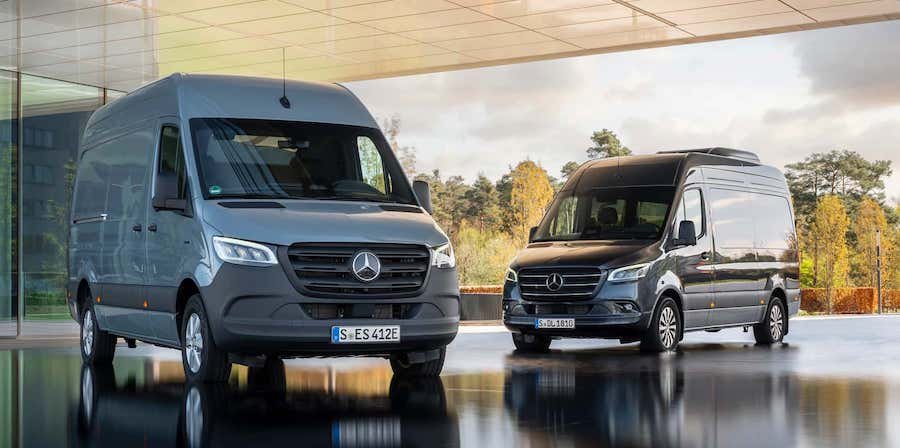2025 Mercedes-Benz eSprinter Gets New Smaller Battery Option At A Lower Price

Mercedes-Benz introduces a new 2025 model year version of the Sprinter and all-electric eSprinter vans in North America, where they will be available at dealerships in the second half of 2024.
Besides a set of general improvements, the new model year also brings expansion to the eSprinter with a new entry-level battery option and more vehicle configurations.
Initially, the 2024 Mercedes-Benz eSprinter was available only with a 113-kilowatt-hour battery (net capacity) starting at an MSRP of $71,886 ($74,181 including a $2,295 destination charge).
Now, there will also be an 81-kWh battery (usable capacity) version offered at a significantly lower price point of $61,250 (plus a $2,295 destination fee for a total of $63,545).
That's over $10,000 less, but less battery capacity (by 32 kWh or almost 40%) will also translate into a lower range of up to about 204 miles (329 km) in the WLTP test cycle (there is no EPA range estimate available). For reference, the bigger battery offers up to 297 miles (478 km) of WLTP range (some 45% more).
The German manufacturer notes that businesses have different needs when it comes to range, cargo volume and payload. Because of that, it's important to expand the product mix and provide options that are tailored to specific commercial purposes, like inner-city local transport or regional feeder transport.
- 81 kWh (net): 204 miles (329 km) WLTP
- 113 kWh (net): 297 miles (478 km) WLTP
*The real-world range number might be lower than WLTP and depends on the exact vehicle configuration (wheelbase, roof height, and more).
For the sake of reference, the base 2024 Mercedes-Benz Sprinter starts at an MSRP of $50,900, so the premium to go electric is $10,350 (although not all features might be the same in the two types).
The Mercedes-Benz eSprinter is modular and has multiple configurations, including the largest 170-inch wheelbase with high roof (113 kWh version). The new 2025 model year brings a shorter, 144-inch wheelbase and standard roof (81 kWh). All eSprinter variants have the same permissible gross vehicle weight of up to 9,370 lbs (4,250 kg).
The difference is in payload and cargo volume:
- 144-inch with standard roof (81 kWh): up to 3,516 lbs and up to 319 cubic feet
- 170-inch with a high roof (81 kWh): up to 3,120 lbs and up to 488 cubic feet
[almost 500 lbs more than 113 kWh] - 170-inch with a high roof (113 kWh): up to 2,624 lbs and up to 488 cubic feet
The Mercedes-Benz eSprinter continues to be powered by a permanent magnet synchronous motor (rear-wheel drive). The base version has a peak output of 100 kilowatts (134 hp), but there is also a 150-kW (201 hp) option. Peak torque is 400 Nm (295 ft.-lb.) in both cases.
There is a 9.6-kW on-board charger (AC) and a DC fast charging capability (CCS1). The standard DC power output is 50 kilowatts, but optionally it can be up to 115 kW, which enables to recharge the battery from 10 to 80% state-of-charge (SOC) in just over 30 minutes (at a 400-volt, 300-amp charger), the company says.
The 2025 Mercedes-Benz eSprinter will offer the latest generation of the MBUX (Mercedes Benz User Experience) multimedia system with a 10.25-inch display. According to Mercedes-Benz, it has "faster computing power and further improved menu navigation, granting customers a digital and interactive experience". The MBUX comes with an integrated smartphone connection to Apple CarPlay and Android Auto. Another important element is over-the-air (OTA) software updates.
Mercedes-Benz enhanced safety and assistance systems (like the standard Active Brake Assist) with new or further developed functions on the eSprinter, as well as upgraded standard equipment of the model.
The standard equipment of the 2025 Mercedes-Benz eSprinter features the new multifunction steering wheel with capacitive sensors, tire pressure monitoring (front/rear) for dual rear wheel models, rain sensor, entry handles on the front doors and passive child detection in the crew or passenger models. If needed, there is the Winter Package PLUS that adds heated front seats, a heated steering wheel and a wet wiper system, which might help to maintain range in cold weather.
In 2023 Mercedes-Benz sold in the U.S. close to 70,000 vans (on top of roughly 285,000) passenger cars. We will see whether the all-electric eSprinter will make a splash among Mercedes-Benz's vans and how it will compete against the Ford E-Transit—the U.S. most popular electric van.
Related News
